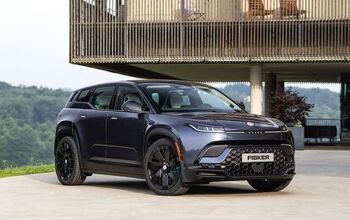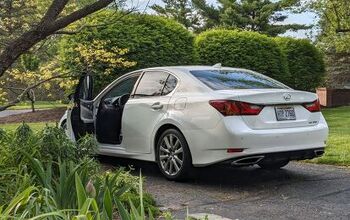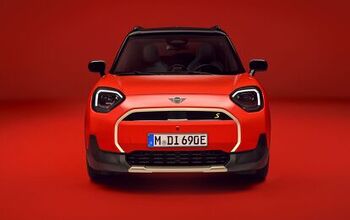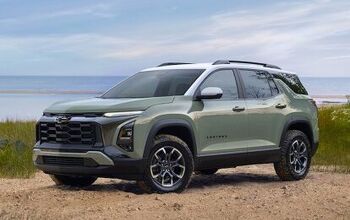To Date, There Are 13 Volvo V90 Cross Countrys in America for Every Standard Volvo V90
Through the end of September 2017, Americans have registered 13 times more Volvo V90 CCs than Volvo V90s, clarifying with purchasing habits what every auto industry observer, casual or professional, already knew.
Volvo’s surely not surprised, either. After all, if you want to acquire a low-slung Volvo V90, Volvo forces U.S. customers to actually order the car. (Perish the thought.)
Even less surprising is the frequency with which Volvo now sells wagons. Combined, the four V60 and V90 variants account for fewer than one-in-10 Volvo USA sales through the first three-quarters of 2017.
Volvo does, however, offer a small fleet of increasingly popular utility vehicles. In September, with XC90 availability improving and the new XC60 coming on stream, Volvo reported a 51-percent year-over-year uptick in utility vehicle volume, a gain of nearly 1,900 sales.
Volvo’s U.S. car sales were also on the rise in September, though the 21-percent surge on that side of the ledger was caused largely by sedans. S60 sales rose 21 percent. The newer S90 jumped 488 percent to 865 units, the fourth consecutive month above 800 units for the flagship sedan. Even excluding SUVs, wagons still only accounted for fewer than one out of every five Volvo sales.
Volvo’s wagon sales results have fallen dramatically since the first-generation XC90 arrived to fulfill the wishes of modern luxury consumers — wagons produced one-third of Volvo’s U.S. volume in 2002 — but the numbers remain just strong enough for wagons to be a key component of Volvo’s U.S. lineup.
No, from a volume perspective, wagons are all but trivial in the Volvo lineup. Even with recent wagon surges at Volkswagen, only 6 percent of Volkswagen’s September U.S. volume was wagon-derived. (27 percent came down to SUVs/crossovers.)
But wagons foster a level of loyalty among a very demanding buyer demographic of which Volvo doesn’t yet want to give up. Wagons are part of Volvo lore, vital protagonists in Volvo’s anthology, style icons of the future. Volvo without wagons is like Ferrari without V12s, like the Red Wings without Yzerman, birthday cake without icing.
Yes, Volvo needs wagons. Unfortunately, American car buyers don’t very much need Volvo wagons. And of the big Volvo wagons that are finding homes in the United States, almost all of them hide their wagonness with 2.3 extra inches of ground clearance and plenty of wheelarch cladding.
For Volvo’s U.S. operations, the very inclusion of the non-CC V90 in the lineup is basically a sales model experiment. There’s no marketing for the model outside its appearance on Volvo’s website. An ordered car will take three months to arrive, saving the dealers the pain of carrying inventory of an inevitably unpopular model. Building the car online — with dealer-completed transactions, of course — is what Volvo’s outgoing U.S. CEO Lex Kerssemakers calls “a win-win situation.”
It’s such a victorious solution that a grand total of 120 customers have taken Volvo up on the offer so far.
[Images: Volvo Cars]
Timothy Cain is a contributing analyst at The Truth About Cars and Autofocus.ca and the founder and former editor of GoodCarBadCar.net. Follow on Twitter @timcaincars and Instagram.
More by Timothy Cain
Latest Car Reviews
Read moreLatest Product Reviews
Read moreRecent Comments
- Varezhka I have still yet to see a Malibu on the road that didn't have a rental sticker. So yeah, GM probably lost money on every one they sold but kept it to boost their CAFE numbers.I'm personally happy that I no longer have to dread being "upgraded" to a Maxima or a Malibu anymore. And thankfully Altima is also on its way out.
- Tassos Under incompetent, affirmative action hire Mary Barra, GM has been shooting itself in the foot on a daily basis.Whether the Malibu cancellation has been one of these shootings is NOT obvious at all.GM should be run as a PROFITABLE BUSINESS and NOT as an outfit that satisfies everybody and his mother in law's pet preferences.IF the Malibu was UNPROFITABLE, it SHOULD be canceled.More generally, if its SEGMENT is Unprofitable, and HALF the makers cancel their midsize sedans, not only will it lead to the SURVIVAL OF THE FITTEST ones, but the survivors will obviously be more profitable if the LOSERS were kept being produced and the SMALL PIE of midsize sedans would yield slim pickings for every participant.SO NO, I APPROVE of the demise of the unprofitable Malibu, and hope Nissan does the same to the Altima, Hyundai with the SOnata, Mazda with the Mazda 6, and as many others as it takes to make the REMAINING players, like the Excellent, sporty Accord and the Bulletproof Reliable, cheap to maintain CAMRY, more profitable and affordable.
- GregLocock Car companies can only really sell cars that people who are new car buyers will pay a profitable price for. As it turns out fewer and fewer new car buyers want sedans. Large sedans can be nice to drive, certainly, but the number of new car buyers (the only ones that matter in this discussion) are prepared to sacrifice steering and handling for more obvious things like passenger and cargo space, or even some attempt at off roading. We know US new car buyers don't really care about handling because they fell for FWD in large cars.
- Slavuta Why is everybody sweating? Like sedans? - go buy one. Better - 2. Let CRV/RAV rust on the dealer lot. I have 3 sedans on the driveway. My neighbor - 2. Neighbors on each of our other side - 8 SUVs.
- Theflyersfan With sedans, especially, I wonder how many of those sales are to rental fleets. With the exception of the Civic and Accord, there are still rows of sedans mixed in with the RAV4s at every airport rental lot. I doubt the breakdown in sales is publicly published, so who knows... GM isn't out of the sedan business - Cadillac exists and I can't believe I'm typing this but they are actually decent - and I think they are making a huge mistake, especially if there's an extended oil price hike (cough...Iran...cough) and people want smaller and hybrids. But if one is only tied to the quarterly shareholder reports and not trends and the big picture, bad decisions like this get made.



































Comments
Join the conversation
As a wagon driver, I'd say that there really is no point to wagons. CUV/SUV gives you cargo space and a few extra inches of ground clearance so from practicality POV there is no sense in buying a wagon at all. If you want a nice driving car then buy a sedan or a coupe which will always handle better than the wagon. The only reason I bought a wagon is to drive something different from most other people, that's it. It sits very low to the ground so it's always nerve wracking to drive it to make sure you don't rip off your bumper on some slightly higher than average speed bump. But it does drive very nice and almost no one has one like mine :)
First it was Infinity with its QX models, now Volvo. Don't they realize those are Nash/Rambler front ends?